School of Social Work News
Pages
- 2022 School of Social Work Innovations Award Recipients
The inaugural Innovation in Research and Teaching Award recognizes research — with either incremental innovation that builds over time, with its impact to be felt in the future, radical Innovations that current issues in the moment they occur and disruptive innovation that challenges the status quo — or existing theories, methods, and pedagogies.
- May 6, 2022
- Child Welfare Student Association Visited Michigan State Capitol
The Child Welfare Student Association visited the Michigan state capitol on April 25 to mark National Child Abuse Prevention Month. The students listened to inspirational speakers, networked with legislators and took a tour of the capitol building.
- May 3, 2022
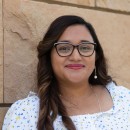 Andrea Mora PhD student (Social Work & Psychology) Awarded Association of Latina/o Social Work Educators Scholarship
Andrea Mora PhD student (Social Work & Psychology) Awarded Association of Latina/o Social Work Educators ScholarshipPhD student (Social Work & Psychology) Andrea Mora was awarded a scholarship from the Association of Latina/o Social Work Educators. The scholarship supports the advancement of social work education especially among the Latino population.
- May 3, 2022
- Learn more »
 Yun Chen PhD student (Social Work & Anthropology) Awarded Barbour Scholarship from Rackham Graduate School
Yun Chen PhD student (Social Work & Anthropology) Awarded Barbour Scholarship from Rackham Graduate SchoolPhD student (Social Work & Anthropology) Yun Chen was awarded a Barbour Scholarship from Rackham Graduate School for the 2022-23 academic year. Barbour established a U-M scholarship for women of the highest academic and professional caliber from the area extending from Turkey in the west to Japan and the Philippines in the east. Barbour scholars study science, medicine, mathematics and other academic disciplines.
- May 3, 2022
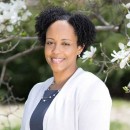 Katrina Ellis Named Inaugural Rogel Scholar in Cancer Health Equity
Katrina Ellis Named Inaugural Rogel Scholar in Cancer Health EquityAssistant Professor Katrina Ellis has been named an inaugural Rogel Scholar in Cancer Health Equity. The award recognizes exceptional faculty dedicated to achieving impact on cancer prevention, patient outcomes and quality of life.
“It's truly an honor to be selected as an inaugural Rogel Scholar in Cancer Health Equity. I am very passionate about improving the support we provide to families after a cancer diagnosis as part of larger efforts to address the disproportionate burden of cancer we see among certain racial and ethnic groups in the United States. This award provides valuable support for my ongoing work in this area, particularly projects that will work in a participatory manner with African Americans families to better understand and address their cancer-related health needs while building on the strengths and resources that already exist within these family systems.” said Ellis.
- May 3, 2022
- Learn more »
 Daicia Price Recognized by WCC Foundation Women's Council
Daicia Price Recognized by WCC Foundation Women's CouncilThe work and achievements of Clinical Assistant Professor Daicia Price will be recognized at the 2022 WCC Foundation Women's Council Celebration of Women's Leadership—a virtual event on Wednesday, May 25 at 5 PM. The award honors women who have made significant contributions to the Washtenaw County community.
- May 2, 2022
- Learn more »
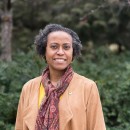 Trina Shanks, Editor on Latest Edition of the Grand Challenges for Social Work and Society
Trina Shanks, Editor on Latest Edition of the Grand Challenges for Social Work and SocietyProfessor Trina Shanks is an editor on the latest edition of the Grand Challenges for Social Work and Society. This second edition outlines bold innovation and collective action powered by proven and evolving scientific interventions to address critical social issues facing society. The chapters tackle problems such as homelessness, social isolation, mass incarceration, family violence and economic inequality.
- April 28, 2022
- Learn more »
 Andy Grogan-Kaylor’s Corporal Punishment Research Cited in the Guardian
Andy Grogan-Kaylor’s Corporal Punishment Research Cited in the GuardianProfessor Andy Grogan-Kaylor’s corporal punishment research was cited in the Guardian. Wales and Scotland have recently banned hitting, smacking and slapping children – and the children’s commissioner for England wants to introduce the same ban in England.
The 2016 meta-analysis of more than 160,000 children found that hitting as a form of discipline is ineffective at positively changing a child’s behavior, in the short and the long term. The analysis also found that children who were disciplined with physical punishment were more likely to become aggressive, display antisocial behavior and exhibit mental health problems.
- April 28, 2022
- Learn more »
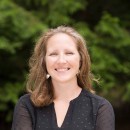 Terri Friedline Advocates for Postal Banking as a Way to Advance Racial Equity
Terri Friedline Advocates for Postal Banking as a Way to Advance Racial EquityAssociate Professor Terri Friedline’s op-ed in The Emancipator on how reviving post office banking could advance racial equity. “More than 60 million Americans – one-fifth of the population – live in communities without a bank. They’re left either to travel long distances to handle their money or use more expensive nearby options like check-cashing companies, payday lenders and currency exchanges,” writes Friedline. Boston University’s Center for Antiracist Research and The Boston Globe’s Opinion team are collaborating to resurrect and reimagine The Emancipator, the first abolitionist newspaper in the United States, founded more than 200 years ago.
- April 27, 2022
- Learn more »
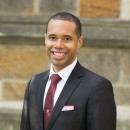 Justin Hodge Appointed Chair of the Commission on Community Action and Economic Opportunity
Justin Hodge Appointed Chair of the Commission on Community Action and Economic OpportunityClinical Assistant Professor Justin Hodge, MSW ‘13, has been appointed Chair of the Commission on Community Action and Economic Opportunity by Governor Whitmer. The commission was created to develop policies and programs to reduce poverty in the state of Michigan. Hodge was appointed to the commission in October, 2021.
- April 27, 2022
- Learn more »